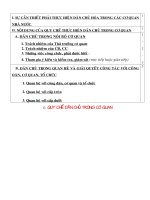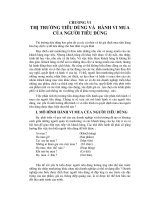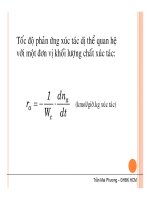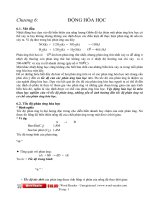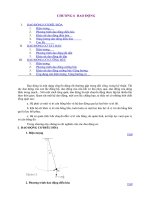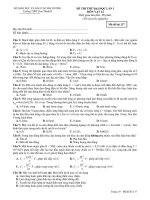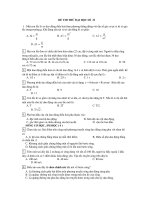PASSAGE 6
Bạn đang xem bản rút gọn của tài liệu. Xem và tải ngay bản đầy đủ của tài liệu tại đây (33.84 KB, 2 trang )
PASSAGE 6
A survey is a study, generally in the form of an interview or a questionnaire, which provides information
concerning how people think and act. In the United States, the best-known surveys are the Gallup poll and
the Harris poll. As anyone who watches the news during campaigns presidential knows, these polls have
become an important part of political life in the United States.
North Americans are familiar with the many “person on the street” interviews on local television news
shows. While such interviews can be highly entertaining, they are not necessarily an accurate indication
of public opinion. First, they reflect the opinions of only those people who appear at a certain location.
Thus, such samples can be biased in favor of commuters, middle-class shoppers, or factory workers,
depending on which area the news people select. Second, television interviews tend to attract outgoing
people who are willing to appear on the air, while they frighten away others who may feel intimidated by
a camera. A survey must be based on a precise, representative sampling if it is to genuinely reflect a
broad range of the population.
In preparing to conduct a survey, sociologists must exercise great care in the wording of questions. An
effective survey question must be simple and clear enough for people to understand it. It must also be
specific enough so that there are no problems in interpreting the results. Even questions that are less
structured must be carefully phrased in order to elicit the type of information desired. Surveys can be
indispensable sources of information, but only if the sampling is done properly and the questions are
worded accurately.
There are two main forms of surveys: the interview and the questionnaire. Each of these forms of survey
research has its advantages. An interviewer can obtain a high response rate because people find it more
difficult to turn down a personal request for an interview than to throw away a written questionnaire. In
addition, an interviewer can go beyond written questions and probe for a subject’s underlying feelings and
reasons. However, questionnaires have the advantage of being cheaper and more consistent.
Question 1. What does the passage mainly discuss?
A. The principles of conducting surveys
B. The importance of polls in American political life
C. The history of surveys in North America
D. D Problems associated with interpreting surveys
Question 2. The word "they" in line 7 refers to______.
A. interviews
B. news shows
C. North Americans
D. opinions
Question 3. According to the passage, the main disadvantage of person-on-the-street interviews is that
they
A. reflect political opinions
B. are used only on television
C. are not carefully worded
D. are not based on a representative sampling
Question 4. The word "precise" in line 10 is closest in meaning to______.
A. rational
B. accurate
C. required
D. planned
Question 5. According to paragraph 3, which of the following is most important for an effective survey?
A. An interviewer's ability to measure respondents' feelings
B. Carefully worded questions
C. A sociologist who is able to interpret the results
D. A high number of respondents
Question 6. The word "exercise" in line 12 is closest in meaning to______.
A. consider
B. design
C. utilize
D. defend
Question 7. The word "elicit" in line 15 is closest in meaning to______.
A. rule out
B. bring out
C. predict
D. compose
Question 8. It can be inferred from the passage that one reason that sociologists may become frustrated
with questionnaires is that______.
A. respondents are too eager to supplement questions with their own opinions
B. respondents often do not complete and return questionnaires
C. questionnaires are expensive and difficult to distribute
D. questionnaires are often difficult to read
Question 9. According to the passage, one advantage of live interviews over questionnaires is that live
interviews______.
A. minimize the influence of the researcher
B. are easier to interpret
C. can produce more information
D. cost less
Question 10. Which of the following terms is defined in the passage?
A. Representative sampling
B. Response rate
C. Public opinion
D. Survey
ĐÁP ÁN
1-A
2-A
3-D
4-B
5-B
6-C
7-B
8-B
9-C
10D
